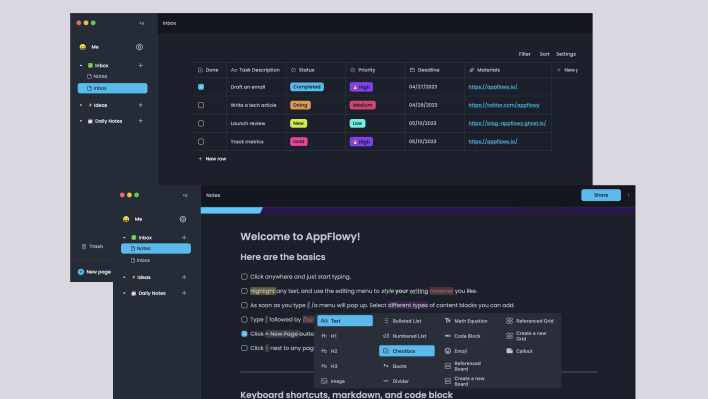A new startup is targeting the lucrative workplace productivity space with an open source approach to project and knowledge management — and it has received backing from a who’s who of investors from across the technology spectrum.
AppFlowy, as the company is called, has raised $6.4 million in funding from a slew of renowned founders, including Matt Mullenweg (Automattic); Steve Chen (YouTube); Tom Preston-Werner (GitHub); Bob Young (Red Hat) and Amr Awadallah (Cloudera). The seed round was led by OSS Capital.
Helping the workforce be more efficient is big business, evidenced by the likes of Notion hitting a lofty $10 billion valuation off the back of remote work-driven demand for collaboration software. However, as proprietary software, businesses — particularly enterprises — might be hesitant to go all-in on a technology they don’t have full control of.
And this, essentially, is what AppFlowy is seeking to address with a self-hostable solution that goes some way toward addressing security and extensibility concerns with the incumbent providers.
Available for Windows, Mac and Linux, AppFlowy includes tools for managing projects, taking notes, tracking the status of individual project items, viewing deadlines and creating documents, among other things that might be familiar to those that use similar virtual workspace tools.

AppFlowy. Image Credits: AppFlowy
However, AppFlowy’s promise is all about control and customizability, allowing companies to tailor their workspace with modular building blocks that can be fine-tuned for specific use cases. And because it’s open source, AppFlowy is able to support community contributions, which can expedite new functionality.
But AppFlowy sees itself as particularly suitable for industries with tight data privacy restrictions.
“Most proprietary collaboration workplace tools share a major limitation — their customers find it too hard or too expensive to have 100% control of their data,” co-founder and CEO Annie Anqi Wang said in a blog post. “As a result, vendor lock-in becomes a tough nut to crack. Users often feel worried when entrusting their sensitive data with these tools, naturally worried about their longevity.”
To the cloud
Founded two years ago by Wang, a former product manager at ByteDance, and CTO Nathan Foo, who was previously a software engineer at TikTok’s parent company, AppFlowy arrived on GitHub under a “copyleft” AGPL-3.0 license in November 2021 and went on to pass 30,000 “stars” in its first year.
With $6.4 million in the bank, the company is now well-financed to build out the platform into a moneymaking business. AppFlowy had introduced self-hosting via Supabase (an open source Firebase alternative) in early September, serving up data storage for those wishing to host AppFlowy in-house. But alongside its funding, the company also unveiled a cloud product, designed for deployment on cloud platforms such as Amazon EC2 and Azure virtual machines.
“Moving forward, we will support team collaboration and enterprise offerings based on AppFlowy Cloud,” Wang told TechCrunch.
Indeed, while self-hosting gives companies unbridled control of their data, it also comes with maintenance costs and challenges that not all companies will be willing or able to cover — which is where AppFlowy Cloud enters the fray.
With the promise of end-to-end encryption (E2EE), AppFlowy hopes to court businesses that are hesitant about leaning on the cloud due to security concerns — however E2EE is entirely optional, and some businesses might prefer not to activate full encryption given that it limits some of the things that users can do. This includes real-time collaborative editing on documents, while it might hinder integrations with certain third-party services, among other impediments.
“People often want E2EE for the utmost security, however, there are several reasons why some people might choose not to opt in for E2EE,” Wang said. “Users prioritizing speed and performance might opt out of E2EE, [and] the lack of recovery options [will mean] that only the user has the keys to decrypt. An organization might [also] choose not to use E2EE because of the regulatory compliance, data retention policies, and management considerations.”
It’s also worth noting that companies can adopt a hybrid local / cloud approach with AppFlowy, enabling them to keep their instance local and only sync to the cloud when required.
“This approach offers a blend of offline experience and cloud connectivity, depending on user needs and preferences,” Wang said. “Data is used in a local environment, and can be uploaded to the cloud when users want to back-up or share it. However, users also have the choice to sync continuously.”
Eventually, AppFlowy Cloud will also be the company’s ticket to monetization, though it will initially be offered completely for free.
“We plan to adopt a freemium model for AppFlowy Cloud, which means that certain premium features will not be included in the free tier,” Wang said. “As these features are still under development, there is no paywall at the moment.”
AppFlowy’s cloud platform is available in private beta now, with its full public launch touted to come “soon.” The company also said that’s working on a mobile app which is scheduled to launch next month, and will help AppFlowy go fully cross-platform.
